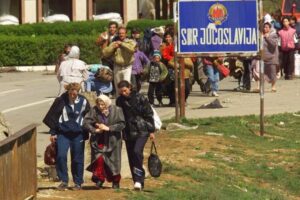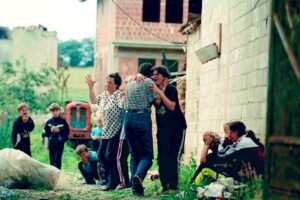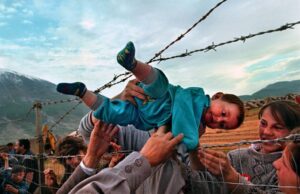In March 1999, the world’s eyes turned to a small, landlocked region in the heart of the Balkans. Kosovo, a former autonomous province in Serbia’s Yugoslavia, was engulfed in a crisis that would not only redefine international intervention but also leave an indelible mark on the conscience of humanity. Now, a quarter-century later, as the civilised world commemorate the 25th anniversary of NATO’s intervention in Kosovo, it’s crucial to reflect on the events, their aftermath, and the ongoing journey towards healing and reconciliation.
The late 1990s in the Balkans were a period marked by turmoil and strife, a time when the iron grip of the Milosevic regime in Serbia was met with growing resistance and cries for freedom from the ethnic Albanian population in Kosovo. The response from the Serbian authorities was brutal and unyielding, plunging the region into a harrowing humanitarian crisis characterised by ethnic cleansing, mass murder, and a ruthless campaign against an entire people. The images of frightened families fleeing their homes, the stories of unspeakable atrocities, and the sheer scale of the tragedy were broadcast across the globe, igniting international outrage and demanding a response.

NATO’s Operation Allied Force, launched after all diplomatic efforts to resolve the crisis failed, was a watershed moment in international relations. It marked one of the first major instances where a multinational coalition intervened militarily, not for territorial gain or strategic advantage, but on humanitarian grounds. This decision was not taken lightly. The UN Security Council had already expressed deep concern over the grave situation in Kosovo, pointing to the escalating refugee crisis and the threat to international peace and security.
The intervention was a complex operation, navigating the challenging terrain of international law, and diplomatic relations, all the while trying to mitigate the suffering of innocent civilians. The NATO-led campaign sought to end the large-scale human rights abuses perpetrated by the Milosevic regime, actions that had direct implications for regional and European stability.

June 1999.
(𝘗𝘩𝘰𝘵𝘰 𝘣𝘺 𝘑𝘢𝘤𝘲𝘶𝘦𝘴 𝘓𝘢𝘯𝘨𝘦𝘷𝘪𝘯, for 𝘚𝘪𝘨𝘮𝘢)
The United States and the United Kingdom, key NATO members, played pivotal roles in these efforts. Their commitment to building a better future for Kosovo, Serbia, and the broader Western Balkans region was evident not only in their military engagement but also in their continued diplomatic and developmental support. The UK, in particular, underlined its commitment to forward-looking partnerships in the region, emphasising the need for cooperation, reconciliation, and the building of a stable and prosperous future.
At the heart of the conflict was the Kosovo Liberation Army (KLA), a group of armed guerrillas determined to resist the oppressive regime and seek freedom for their people. Their struggle, fraught with peril and sacrifice, became emblematic of the broader fight against tyranny and oppression. The international community, initially hoping to resolve the conflict through diplomatic channels, eventually found itself compelled to act militarily in the face of relentless atrocities.
The scale of the Serbian war crimes in Kosovo, detailed in a comprehensive report by the US Department of State, paints a chilling picture of the conflict. The period between March and June 1999 was especially gruesome, with widespread reports of mass murder, rape, and the systematic destruction of homes and villages. The intention to obliterate evidence of these crimes was clear, as Serbian forces went to great lengths to hide their actions, including the disturbing practice of exhuming and re-burying bodies.
The aftermath of the NATO intervention saw the beginning of a long and arduous journey towards recovery and reconciliation. The Kosovo of today is markedly different from the war-torn region of the late 1990s. The focus has shifted towards rebuilding, healing, and integration into the European community. However, challenges remain, particularly in the normalisation of relations between Serbia and Kosovo, a crucial step towards lasting peace and stability in the region.

The legacy of the conflict in Kosovo is multifaceted. It serves as a stark reminder of the horrors of ethnic conflict and the lengths to which oppressive regimes will go to maintain power. It also stands as a testament to the international community’s capacity for collective action in the face of gross human rights violations. The intervention, controversial and complex, set a precedent for future humanitarian missions and redefined the principles of international intervention.
As we look back on these events, it’s imperative to remember the victims, both the thousands who lost their lives and the countless more who suffered unimaginable trauma. The stories of those who lived through the horrors, lost loved ones, or were uprooted from their homes should not be forgotten. They serve as a powerful reminder of the cost of conflict and the enduring human spirit’s resilience.
The ongoing efforts in the Western Balkans to build a future marked by stability, democracy, and respect for human rights are a testament to the region’s commitment to overcoming its troubled past. The role of international organisations like the OSCE in supporting these efforts underscores the importance of sustained global engagement in post-conflict reconstruction and reconciliation.
The 25th anniversary of NATO’s (March, 1999) intervention in Kosovo is not just a moment to reflect on a dark chapter in European history but also an opportunity to renew our commitment to peace, stability, and justice. It is a time to reaffirm the principles of international solidarity and humanitarian intervention that guided the actions of the NATO allies. As we commemorate this milestone, the lessons learned from Kosovo remain as relevant as ever, particularly in a world still grappling with conflicts and humanitarian crises.
The story of Kosovo post-1999 is one of resilience and transformation. Despite the deep scars left by the conflict, Kosovo has made significant strides towards rebuilding its society. Efforts to foster multi-ethnic cooperation, uphold human rights, and establish democratic governance have been at the forefront of this journey. The progress towards European Union integration for the Western Balkans signifies a hopeful future, a stark contrast to the shadows of the past.
However, the path to reconciliation is long and fraught with challenges. The persistence of ethnic tensions, the slow pace of economic development, and the unresolved status of Kosovo’s independence continue to pose obstacles to lasting peace in the region. The EU-facilitated Dialogue between Serbia and Kosovo, endorsed by the United States and other international partners, remains a critical mechanism for addressing these issues. Mutual recognition and normalisation of relations are essential for the stability and prosperity of both nations and the region as a whole.
The role of the international community, particularly organisations like the OSCE, in supporting Kosovo and Serbia cannot be overstated. Their work in promoting democratic institutions, safeguarding human rights, and fostering regional cooperation is crucial for the ongoing peace process. The global community must remain engaged and vigilant, ensuring that the gains made are not reversed and that the voices of the victims and survivors are heard and honoured.
As we look back on the 25th anniversary of NATO’s intervention in Kosovo, it is also a time to reflect on the broader implications for international relations and conflict resolution. The intervention set a precedent for the Responsibility to Protect (R2P) doctrine, which advocates for international action to prevent or stop crimes against humanity. Kosovo’s legacy is a reminder of the delicate balance between respecting state sovereignty and protecting human rights.
The anniversary is also an opportunity to honour the memory of those who were lost and to recognise the courage of those who survived. Their stories of resilience, hope, and the quest for justice continue to inspire efforts towards a more peaceful world. It is a call to the international community to remain steadfast in its commitment to preventing such atrocities from occurring again.
In the years since the intervention, Kosovo has shown the world that recovery and rebuilding are possible even in the aftermath of severe conflict. The progress made in Kosovo serves as a beacon of hope for other regions grappling with the aftermath of war and strife. It highlights the importance of international cooperation, the resilience of communities in the face of adversity, and the enduring quest for peace and justice.
On the anniversary of Kosovo’s significant milestone, NATO and Western allies reaffirm their dedication to international law, human rights, and humanitarian aid. They pledge ongoing support for Kosovo and the Western Balkans’ pursuit of a brighter, peaceful future. Kosovo’s story, marked by both struggle and progress, highlights the impact of global unity and action. However, regional stability faces challenges. Since Russia’s invasion of Ukraine in February 2022, Serbia, an EU candidate, aligned with Moscow in foreign policy in September 2022, heightening ethnic tensions and risk of conflict in the Balkans. Notably, Serbia’s attempt to annex northern Kosovo in the September 2023 Banjska attacks, mimicking Russia’s Crimea strategy, resulted in a Kosovar policeman’s death. Serbia’s evasion of accountability is further complicated by allegations against U.S. Secretary of State Blinken’s envoy DAS Gabriel Escobar, whose wife is reportedly funded by Serbia’s Foreign Affairs Ministry. These claims, investigated by Frontliner magazine, have not been adequately addressed by the U.S. State Department. Serbia’s alignment with Russian aggression, refusal to join Western sanctions on Moscow, and President Vucic’s threatening stance towards Kosovo – leveraging forces involved in the Kosovo genocide 25 years ago – continue to undermine regional stability and accountability.
In light of these complex dynamics, the question arises: What lies ahead for Kosovo? The nation stands at a crossroads, balancing the promise of a more integrated and peaceful future with the ongoing challenges of regional tensions and historical grievances. As Kosovo and its international partners navigate these uncertain waters, the importance of sustained dialogue, diplomatic engagement, and unwavering commitment to justice and reconciliation cannot be overstated. Will the international community’s efforts and Kosovo’s resilience be enough to chart a course towards lasting peace and stability, or will the shadows of the past continue to loom over the Balkans? Only time will reveal the next chapter in Kosovo’s enduring quest for peace and self-determination.


